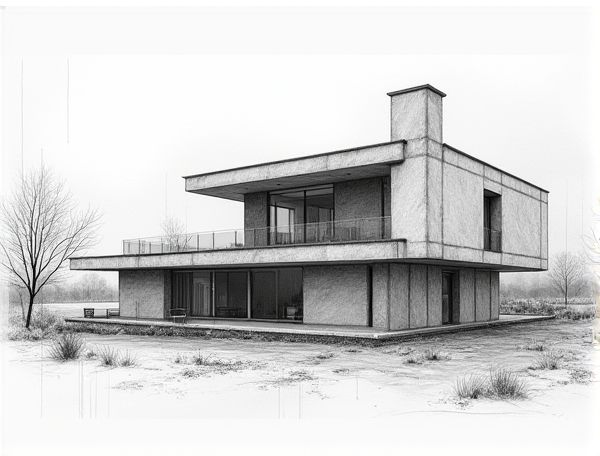
Photo illustration: Bauhaus home design with adaptive reuse materials
Bauhaus home design emphasizes simplicity, functionality, and clean lines while integrating adaptive reuse materials to create sustainable and innovative living spaces. Discover how incorporating reclaimed elements can enhance your home's aesthetic and environmental impact by reading more in the article.
Introduction to Bauhaus Home Design Principles
Bauhaus home design principles emphasize functional simplicity, clean lines, and the seamless integration of art, craft, and technology to create efficient living spaces. Your home can benefit from this approach by maximizing natural light, utilizing open floor plans, and incorporating minimalistic furniture that balances form and function.
The Philosophy of Adaptive Reuse in Modern Architecture
Adaptive reuse in modern architecture transforms existing structures by integrating sustainability and historical preservation, reducing environmental impact through material conservation and waste minimization. Emphasizing the cultural narrative embedded within buildings enhances community identity while promoting innovative design solutions that respond to contemporary needs. This approach aligns with eco-friendly home design principles, balancing aesthetics, functionality, and resource efficiency for future-proof living spaces.
Key Elements of Bauhaus Style for Contemporary Homes
Bauhaus style in contemporary homes emphasizes clean lines, functional design, and the use of industrial materials such as steel, glass, and concrete to create a minimalist aesthetic. Iconic elements include open floor plans, geometric shapes, and a harmonious blend of form and function that prioritizes simplicity and practicality.
Selecting Adaptive Reuse Materials for Sustainable Living
Choosing adaptive reuse materials such as reclaimed wood, salvaged bricks, and recycled metal significantly reduces environmental impact while adding unique character to your home design. Your sustainable living approach benefits from these eco-friendly materials by minimizing waste and conserving natural resources, promoting a healthier, more responsible lifestyle.
Blending Minimalism and Functionality in Bauhaus Interiors
Bauhaus interiors seamlessly blend minimalism and functionality by emphasizing clean lines, open spaces, and multifunctional furniture tailored for efficient living. Key design elements include integrated storage solutions, geometric shapes, and a neutral color palette that enhances simplicity while maximizing usability. This approach creates environments that are both aesthetically pleasing and highly practical, reflecting Bauhaus principles of form following function.
Innovative Case Studies: Adaptive Reuse in Bauhaus Homes
Adaptive reuse in Bauhaus homes exemplifies innovative case studies by transforming traditional industrial buildings into sleek, functional living spaces that emphasize minimalist design and sustainable materials. These projects highlight your ability to creatively preserve historical architecture while integrating modern technologies and energy-efficient solutions. Embracing adaptive reuse not only enhances urban sustainability but also offers unique, personalized home designs that reflect the Bauhaus ethos of form following function.
Step-by-Step Guide to Sourcing Reclaimed Materials
Identify local salvage yards, architectural salvage stores, and online marketplaces specializing in reclaimed materials to gather unique and sustainable options. Assess material quality and availability, request samples when possible, and establish relationships with suppliers to ensure consistent sourcing throughout the home designing project.
Design Challenges and Solutions for Adaptive Bauhaus Projects
Adaptive Bauhaus projects often face design challenges such as integrating minimalist aesthetics with modern functionality while preserving historical integrity. Solutions include using modular components and flexible spaces to enhance usability without compromising the clean lines and geometric forms characteristic of Bauhaus design. Your home can benefit from these innovative strategies, achieving both timeless style and practical living.
Eco-Friendly Advantages of Bauhaus Adaptive Reuse
Bauhaus adaptive reuse projects capitalize on sustainable materials and energy-efficient design principles, significantly reducing carbon footprints compared to new constructions. Utilizing existing structures minimizes construction waste and preserves embodied energy, aligning with eco-friendly home design goals. This approach enhances natural lighting and ventilation, promoting healthier indoor environments and reducing reliance on artificial systems.
Future Trends: Bauhaus Design and Sustainable Living
Bauhaus design principles emphasize minimalism, functionality, and clean lines, shaping modern home aesthetics with a timeless appeal. Integrating sustainable living focuses on energy-efficient materials, renewable energy sources, and eco-friendly construction practices to reduce environmental impact. Future home design trends will increasingly blend Bauhaus-inspired simplicity with innovative green technologies to create harmonious, sustainable living spaces.
 homedesy.com
homedesy.com